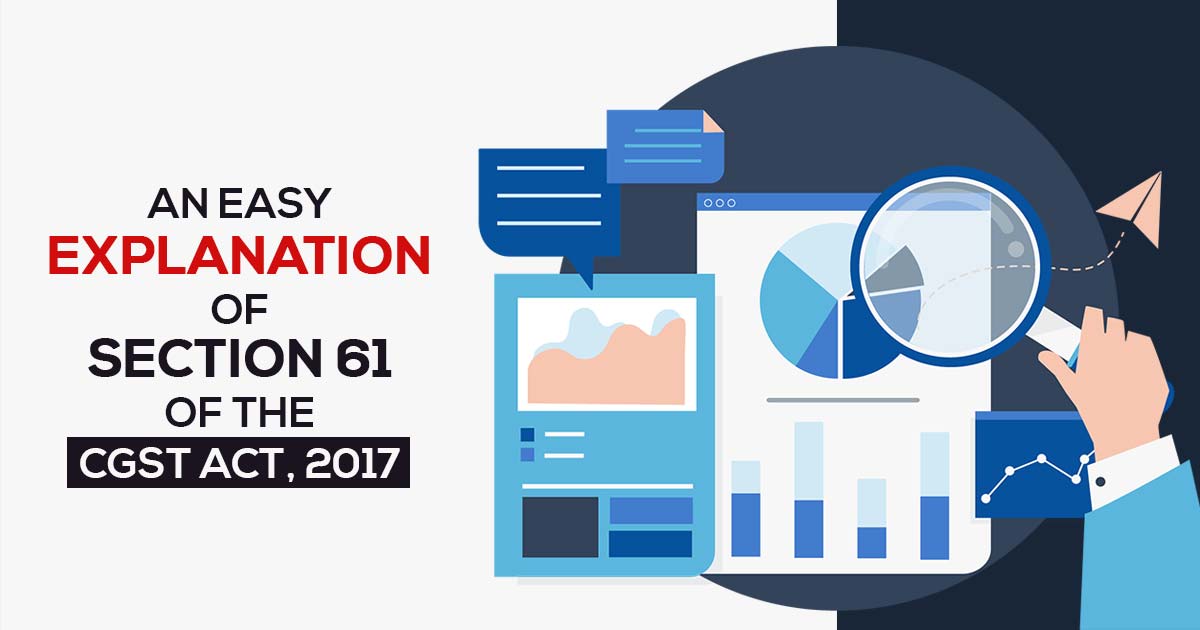
The Central Goods and Services Tax (CGST) Act, 2017, is a foundation of the Goods and Services Tax (GST) framework of India which ensures tax administration and compliance. Section 61 among distinct provisions plays a significant role in keeping the precision and clarity of tax filings.
The same blog furnishes information about section 61, along with its text, key provisions, and practical implications for taxpayers.
Scrutiny of GST Returns [Section 61]
In this article, we outline the scrutiny provisions of Section 61 of the CGST Act, 2017.
- Scrutiny of GST Returns: The proper officer might investigate the return and pertinent particulars provided via the GST registered person to verify the precision of the return and notify them of any discrepancies observed in the specified mode and ask for their explanation.
- Discrepancies Resolution: If the explanation is discovered acceptable then the registered person will be notified as per that and no other measure will then be taken for the same concern.
- Additional Measures in Case of Inaction or Unsatisfactory Explanation: If no effective explanation is been furnished within 30 days or within this additional duration as allowed via the proper officer or if the registered person is unable to take the corrective measure post accepting the discrepancies, then the proper officer might begin precise measure under Section 65, Section 66, Section 67, or determine the tax and other dues under Section 73 or Section 74.
Explanation of Section 61 of the CGST Act
Below, we provide a detailed explanation of all the key provisions of Section 61.
Scrutiny Authority
Section 61 provides the authority to the proper officer to investigate the returns furnished via the registered taxpayers. The same procedure comprises verifying the precision of the data furnished along with the taxable amounts, input tax credits (ITC), and tax payments.
- Objective: The objective is to find the errors, omissions, or mismatches in returns to avert revenue leakage.
- Scope: The scrutiny is concentrated only on the furnished data in the returns and pertinent documents instead of the full-scale investigation.
Transmission of Discrepancies
The proper officer on discovering the discrepancies is mandated to report the taxpayer in the specified manner and ask for an explanation.
- Method of Communication: Discrepancies are communicated via the GST portal with taxpayers answering electronically.
- Discrepancies Examples: Mismatches between GSTR-3B and GSTR-1, discrepancies between claimed ITC and GSTR-2B, or inconsistencies in tax payments are some common problems.
Reasonable Reason
When the taxpayer furnishes an acceptable explanation then the case is solved and no additional measure is chosen.
- Taxpayer Implication: A timely and precise answer assists in preventing the rise of the problem and preventing audits or inspections.
- Example: The officer might close the case if a taxpayer explains that an ITC mismatch is because of timing differences in supplier reporting.
Lack of Reaction or Silence
If the taxpayer does not furnish an adequate explanation within 30 days (or an extended period) or is unable to correct the discrepancies post considering them then additional measures might be initiated.
Possible Actions These contain:
- GST Audit (Section 65): A detailed examination of records and returns.
- Special GST Audit (Section 66): Conducted by a chartered accountant or cost accountant
- Inspection, Search, and Seizure (Section 67): In cases of significant non-compliance
- Tax Determination (Section 73/74): Issuing demand notices for underpaid taxes
Measures to Correct
The taxpayers who accept the discrepancies should correct them in the following returns. Unable to perform the same can result in additional escalation.
Importance of Compliance: The immediate corrective measures show an influential faith and can support reducing the penalties or additional search.
Demand Note Under Section 61 of the CGST Act
It should be marked that no demand for the tax can be raised u/s 61 of the CGST Act, 2017. The provisions merely deal with the scrutiny of returns and the identification of discrepancies.
If a demand for the tax or penalties is to be raised then it needs to invoke the provisions of Section 65 (Audit), Section 66 (Special Audit), Section 67 (Inspection, Search, and Seizure), or Section 73/74 (Tax Determination and Recovery of Dues). Such sections emphasize the significant process for the determination and cancellation of taxes, along with the issuance of demand notices.
Aspects of Process Under Section 61
Section 61 procedural aspects are shown in Rule 99 of the CGST Rules, 2017, which specifies the following:
- GST Notice of Discrepancy: Issued in Form GST ASMT-10.
- Response on Submission: Taxpayers should answer using Form GST ASMT-11, furnishing the explanations and supporting documentation.
- Closure of Proceedings: If discrepancies are resolved, the proper officer issues Form GST ASMT-12 to close the case.
Taxpayers Practical Implications
- Proactive GST Compliance: Regular reconciliation of returns with accounting records, vendor data, and payment information can assist avert discrepancies.
- Fast Reactions: Quick and precise answers to notices u/s 61 are significant to prevent audits or penalties.
- Uses of Technology: Using automated tools for data validation and reconciliation can assist in reducing errors in returns.
Comparision Between Similar Provisions
- Section 65 vs. Section 61: Section 61 concentrates on the investigation of the returns, and Section 65 is related to the audits, that comprise on-site records verification.
- Section 74 vs. Section 61: Section 74 addresses the tax determination in matters of fraud or wilful misstatement, while Section 61 is related to determining and addressing the discrepancies in tax filings.
Closure: Section 61 of the CGST Act, 2017, outlines the significance of maintaining precision and clarity in GST compliance. It has the motive to keep the tax system’s integrity by providing the authority to the proper officer to scrutinize returns and ask for explanations for discrepancies while proposing a chance for the taxpayers to solve the problems without prompt action.
Businesses should hold correct reporting and timely reconciliation of their returns to streamline the scrutiny procedure and mitigate the risk of additional statutory complications.